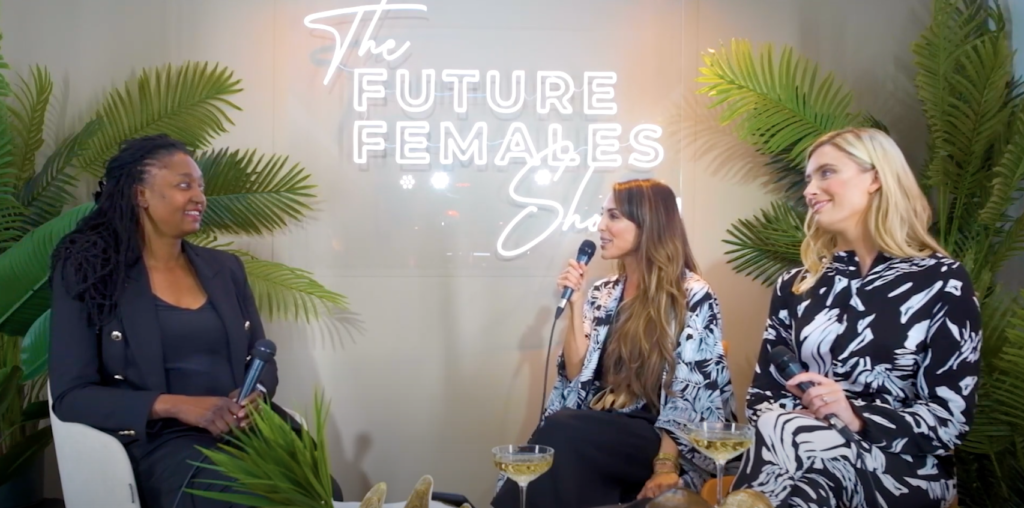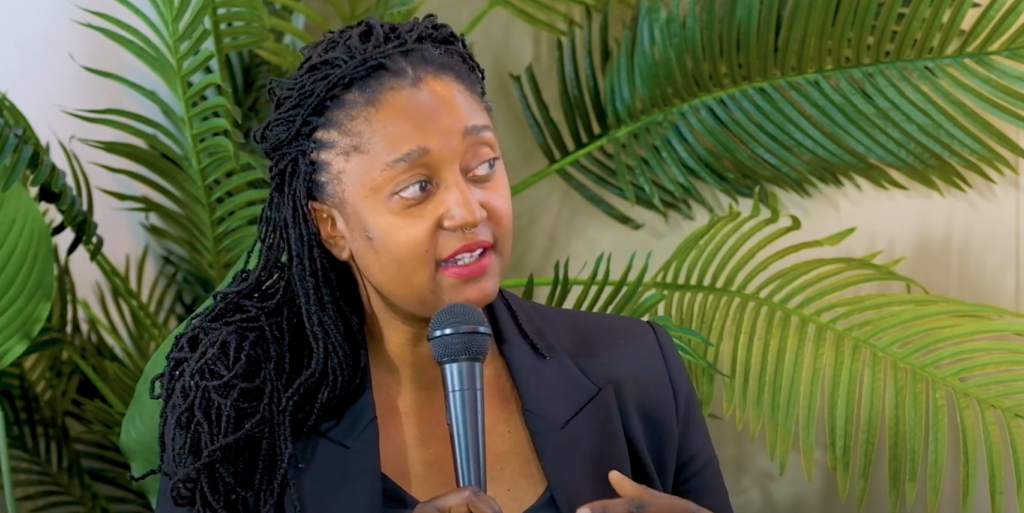Felicity Berold is the CEO of Sun Ship Technologies, a clean technology company offering innovative solar, energy storage, and e-mobility products, financing, and value-adding services. The extensive product range includes stand-alone systems designed and pre-engineered for homes, home offices, small businesses, or larger-scale projects such as farms.
In episode #11 of the Future Females Show, hosted by Media Personality & Transformational Coach, Susana Kennedy, and Co-Founder & CEO of Future Females, Lauren Dallas, Felicity talks about Sustainable Energy Solutions and whether Elon Musk’s power can be harnessed on African soil.
ALSO SEE: Liza Pavlakos: How to Be a Purpose-Driven Entrepreneur
Tell us more about yourself – how did you come to create your business?
The business was actually founded by my husband, so it is in essence a family business. I worked in Tourism and when the pandemic hit, I had to close down my business – that is when I joined the family business. My husband had been working with renewable energy companies, doing 10-rugby-fields-put-together of solar. He was doing these projects as industrial and commercial utilities for Eskom and that is when we found a gap in the residential solar market.
What gave you, as a partner of the business, the courage to take on such a massive problem?
I am on a very steep learning curve. Every day I am learning something new and we all know how good that feels. Since we already encountered difficulty with energy on our own property at home, we started to think about how we could cope with load shedding. The fact that we care about the environment and the cost of electricity became something that made me feel more interested in the business.
Do you find that you have the right people to fit the right tasks, while still being able to create the company you envisioned?
Absolutely. It is just so great that we have what we call our secret weapon – he is our king of R&D (research and development), so basically whatever tech you have today, you need to always be pushing to the next level and thinking about what could change in the environment that will make your technology better or more relevant. It is keeping a sense of being humble and open-minded and knowing that it is a learning curve all the way.
ALSO SEE: Lorna Mlonzi: From Township Living to Lunch with Richard Branson
What are your products and who are you serving with them?
I am not going to lie to you about load shedding, but it really is something for us… We did not start out thinking about load shedding, we actually started out thinking about rooftop solar systems. These systems were initially created for residential customers who are usually high net-worth individuals working in a job where they can not be without power – advocates, media executives, bankers… people who can work from home but can not work when load shedding is in play. That really has been a great opportunity for us.
We are working with solar panels, inverters, and batteries for storage (because you want to be able to store your electricity in that space of time when load shedding is happening). We have a product called the PowerBox, which is a smart UPS that can be used to plug in a big-screen television, a laptop, some lighting, a Wi-Fi router, and you can keep ticking over through that period of three hours (of load shedding). We also look at rooftop solar where you use a solar-ready unit to charge it – meaning it can remain plugged in at the mains to recharge its cells so that you do not need a solar panel. It does, however, come with a plugin point that allows you to connect one or two panels if you want that option. You can also take it with you when you go camping! It is basically a portable, reliable, clean, quiet sole source of electricity. Then we also have a hybrid solar system for a home where you can have batteries, but also up to 12 panels on your rooftop – depending on how much rooftop space you have. We call it hybrid because you have the batteries as a backup.
What is the current energy crisis that we are really facing in South Africa?
The newest buzzword that I picked up this week was around Just Energy Transition (JET). We are talking about a partnership of about 8.5 billion dollars. It is an opportunity for companies to start cleaning up their act and also take the opportunity to create renewable energy solutions. We just had the COP26 summit in Scotland and coming up again in November will be in Egypt. South Africa is in a big hurry to create this partnership because we want and need that money! It is not to say that we are going to allow oil and gas companies that have been doing “misdemeanours”, but we are actually concerned about the communities around where those projects are going to be and about projects that are female lead. There is an opportunity for us to make a change and we are looking at the next 30 to 50 years when we can try to go toward net zero.
How are you setting your products apart?
It is all about quality because you really can not compromise on quality components. What sets us apart is that we offer a long warranty. We tell our customers that we cover the technology that we supply to them for five years. We know our PowerBox probably has a 10-year lifespan and we use top-quality components. For example, our batteries come from the same factory that Elon Musk is getting his from for Tesla.
In a country where the poverty line is something that we are constantly looking at, what are the possible solutions that are cost-effective for the majority of people versus executives that can afford these solutions?
It is something that has kept us awake at night. But our solution is that we are now poised to raise funds in order to allow pay-as-you-go functionality for our products. We have a contract in place, which is a standard rental agreement.

How do you experience working with your husband?
It is really about giving each other the space to be where we can be most effective and creative. There are things that I know are on his beat, so we try to have a weekly meeting that is around business and admin and other topics that we talk about in other meetings – we basically have around three meetings a week. We try to give each other the space we both need.
ALSO SEE: Oyama Botha: How to Practice Radical Self-Love
What would you say to people with regards to switching over to energy solutions that are more sustainable?
I would advise to do it in a modular fashion as if you have building blocks. Begin by renting a PowerBox and as time goes on, you pace yourself. You can build on your renewable energy system bit by bit. It is possible.
What would be your advice to women who are really passionate about the problems this is solving but are feeling like it is an overwhelming space to step into?
It is a very overwhelming space but what I would suggest is to do something each day toward that which will feed the need. Whether it is taking plastics off the beach when you happen to go for a beach walk at sunset or switching off unnecessary lights in your house or switching to cooking with gas. Taking your own recycling and your own electricity usage into account, will make a big difference.
What is your vision for your business?
I see it as manufacturing in different African locations. I see us having a factory in Namibia, Kenya or Ghana… I am really excited about Africa because when you take a photograph of planet earth from outer space, you can see that there are lights on in certain remote contexts on the African continent. Just thinking about the opportunities makes me feel very excited to light up the continent.
What is the environmental impact of using electricity?
It is difficult to quantify but for example, just using Eskom electricity as opposed to solar, wind, or maybe even hydro the impact in terms of the particles of carbon is clear. If tax is imposed, people will feel that and know that their use of electricity is damaging to the environment. We are seeing it already with petrol and diesel – it is escalating. If monetary tax is put on, I think people will understand that more easily and more quickly.
ALSO SEE: Aunnie Patton-Power: How to Attract Angel Investment
What is the biggest challenge that you have faced so far within this industry and that you have overcome?
Attention to detail. There is a lot of red tape when you are trying to put a residential solar system in place. It is quite important to keep your eye on the details and not be daunted by all the forms that you have to fill in!
If you could celebrate one thing about yourself, that you are proud of achieving so far, what would it be?
I would say it is my capacity to take on new things and learn. It is something that I really appreciate, having the opportunity to be able to pivot and switch from one industry to another.
Watch the show episode video here:
Pssst…
Future Females is building the first community-based learning experience for women who want to invest in themselves and their future dream businesses. Want to know more? Be the first to access the platform HERE!

